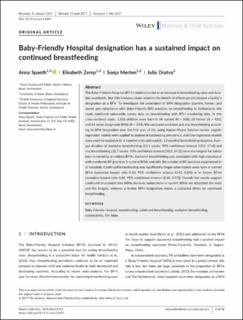Please use this identifier to cite or link to this item:
https://doi.org/10.21256/zhaw-3878Full metadata record
| DC Field | Value | Language |
|---|---|---|
| dc.contributor.author | Spaeth, Anna | - |
| dc.contributor.author | Zemp, Elisabeth | - |
| dc.contributor.author | Merten, Sonja | - |
| dc.contributor.author | Dratva, Julia | - |
| dc.date.accessioned | 2018-07-17T14:15:14Z | - |
| dc.date.available | 2018-07-17T14:15:14Z | - |
| dc.date.issued | 2018 | - |
| dc.identifier.issn | 1740-8695 | de_CH |
| dc.identifier.issn | 1740-8709 | de_CH |
| dc.identifier.uri | https://digitalcollection.zhaw.ch/handle/11475/8239 | - |
| dc.description.abstract | The Baby-Friendly Hospital (BFH) Initiative has led to an increase in breastfeeding rates and duration worldwide. But little is known about whether the beneficial effects persist beyond a facility's designation as a BFH. To investigate the association of BFH designation (current, former, and never) and compliance with Baby-Friendly (BF) practices on breastfeeding in Switzerland, this study combined nationwide survey data on breastfeeding with BFH monitoring data. In this cross-sectional study, 1,326 children were born in 34 current (N = 508), 28 former (N = 425), and 34 never designated BFHs (N = 393). We compared exclusive and any breastfeeding according to BFH designation over the first year of life, using Kaplan-Meyer Survival curves. Logistic regression models were applied to analyse breastfeeding prevalence, and Cox-regression models were used for exclusive (0-6 months) and continued (6-12 months) breastfeeding duration. Average duration of exclusive breastfeeding (13.1 weeks, 95% confidence interval [12.0, 17.4]) and any breastfeeding (32.7 weeks, 95% confidence interval [30.5, 39.2]) were the longest for babies born in currently accredited BFHs. Exclusive breastfeeding was associated with high compliance with monitored BF practices in current BFHs and with the number of BF practices experienced in all hospitals. Continued breastfeeding was significantly longer when babies were born in current BFHs (cessation hazard ratio 0.60, 95% confidence interval [0.42, 0.84]) or in former BFHs (cessation hazard ratio 0.68, 95% confidence interval [0.48, 0.97]). Overall, the results support continued investment into BFHs, because babies born in current BFHs are breastfed the most and the longest, whereas a former BFH designation shows a sustained effect on continued breastfeeding. | de_CH |
| dc.language.iso | en | de_CH |
| dc.publisher | Wiley | de_CH |
| dc.relation.ispartof | Maternal and Child Nutrition | de_CH |
| dc.rights | http://creativecommons.org/licenses/by/4.0/ | de_CH |
| dc.subject | Baby-friendly hospital | de_CH |
| dc.subject | Ten steps | de_CH |
| dc.subject | Breastfeeding | de_CH |
| dc.subject | Continued breastfeeding | de_CH |
| dc.subject | Exclusive breastfeeding | de_CH |
| dc.subject | Sustainability | de_CH |
| dc.subject.ddc | 610: Medizin und Gesundheit | de_CH |
| dc.subject.ddc | 618: Geburtsmedizin und Hebammenarbeit | de_CH |
| dc.title | Baby-friendly hospital designation has a sustained impact on continued breastfeeding | de_CH |
| dc.type | Beitrag in wissenschaftlicher Zeitschrift | de_CH |
| dcterms.type | Text | de_CH |
| zhaw.departement | Gesundheit | de_CH |
| zhaw.organisationalunit | Institut für Public Health (IPH) | de_CH |
| dc.identifier.doi | 10.21256/zhaw-3878 | - |
| dc.identifier.doi | 10.1111/mcn.12497 | de_CH |
| dc.identifier.pmid | 28795789 | de_CH |
| zhaw.funding.eu | No | de_CH |
| zhaw.issue | 1 | de_CH |
| zhaw.originated.zhaw | Yes | de_CH |
| zhaw.publication.status | publishedVersion | de_CH |
| zhaw.volume | 14 | de_CH |
| zhaw.publication.review | Peer review (Publikation) | de_CH |
| zhaw.webfeed | Ernährung | de_CH |
| Appears in collections: | Publikationen Gesundheit | |
Files in This Item:
| File | Description | Size | Format | |
|---|---|---|---|---|
| Spaeth_et_al-2018-Maternal_Child_Nutrition.pdf | 696.04 kB | Adobe PDF |  View/Open |
Show simple item record
Spaeth, A., Zemp, E., Merten, S., & Dratva, J. (2018). Baby-friendly hospital designation has a sustained impact on continued breastfeeding. Maternal and Child Nutrition, 14(1). https://doi.org/10.21256/zhaw-3878
Spaeth, A. et al. (2018) ‘Baby-friendly hospital designation has a sustained impact on continued breastfeeding’, Maternal and Child Nutrition, 14(1). Available at: https://doi.org/10.21256/zhaw-3878.
A. Spaeth, E. Zemp, S. Merten, and J. Dratva, “Baby-friendly hospital designation has a sustained impact on continued breastfeeding,” Maternal and Child Nutrition, vol. 14, no. 1, 2018, doi: 10.21256/zhaw-3878.
SPAETH, Anna, Elisabeth ZEMP, Sonja MERTEN und Julia DRATVA, 2018. Baby-friendly hospital designation has a sustained impact on continued breastfeeding. Maternal and Child Nutrition. 2018. Bd. 14, Nr. 1. DOI 10.21256/zhaw-3878
Spaeth, Anna, Elisabeth Zemp, Sonja Merten, and Julia Dratva. 2018. “Baby-Friendly Hospital Designation Has a Sustained Impact on Continued Breastfeeding.” Maternal and Child Nutrition 14 (1). https://doi.org/10.21256/zhaw-3878.
Spaeth, Anna, et al. “Baby-Friendly Hospital Designation Has a Sustained Impact on Continued Breastfeeding.” Maternal and Child Nutrition, vol. 14, no. 1, 2018, https://doi.org/10.21256/zhaw-3878.
Items in DSpace are protected by copyright, with all rights reserved, unless otherwise indicated.